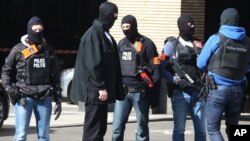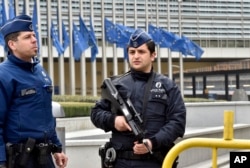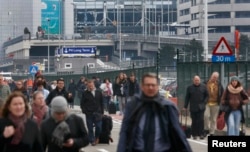Belgium’s capital will remain on virtual lockdown for days while the country’s hard-pressed security services try to determine who was behind Tuesday’s bomb attacks - whether the perpetrators and planners were surviving members of the large network behind last November’s terrorist strike in Paris or the work of a new group that authorities have failed to identify.
Belgian security officials as well as independent analysts suspect that Tuesday’s blasts at Brussels airport and a metro station near the headquarters of the European Union were likely not planned as revenge for the arrest last week of Salah Abdeslam, who oversaw the logistics for the terrorist incident in Paris, and was wounded and apprehended after a brief shoot-out.
They argue the coordinated attacks on Brussels airport and on the Maelbeek metro station would have taken more than four days to plan.
“It was sophisticated and as with the Paris attacks, had many moving parts,” a senior Belgian security official told VOA. “This wasn’t something that was pulled together over the weekend - something hastily arranged to send a terror message about Abdeslam,” he said.
The official, who asked not to be named, said the sophistication could be seen on several levels and cited the fact that even the two blasts at Brussels’ Zaventem airport played off each other. He confirmed that one of the blasts was triggered by a suicide bomber, while the second explosion was triggered remotely.
WATCH: Video footage from scene of attacks
Motive could be revenge
A third unexploded bomb was later found at the airport.
The security official acknowledged that Tuesday’s attacks may have been brought forward as a result of Abdeslam’s arrest for fear he may have had knowledge of the plans, which he could have disclosed to interrogators.
One urgent line of inquiry now is whether an accomplice of Abdeslam, Najim Laachraoui, a 24-year-old Belgian citizen who fought in Syria, may have been involved. If he was, then that would suggest the bombings were carried out by the remnants of the network responsible for the Paris attacks.
Shashank Joshi, a senior research fellow at the Royal United Services Institute, cautions against viewing the attacks solely as revenge for Abdeslam's arrest. “This would take quite a while to plan, particularly involving an explosive, involving an airport. We should be wary of seeing it purely as a retaliation for Salah Abdeslam’s arrest,” he told British media.
Security threat levels raised
Across Europe counterterrorism officials raised security threat levels. In Britain, Prime Minister David Cameron called a meeting of the government’s emergency committee.
Assistant Commissioner Mark Rowley, the national police counterterrorism chief, said in a statement, “As a precaution, forces across the U.K. have increased policing presence at key locations, including transport hubs, to protect the public and provide reassurance. This is not in relation to any specific information or intelligence.”
Security at Gatwick and Heathrow Airports was being stepped up as well.
Maj. Gen. Chip Chapman, the former head of counterterrorism at Britain’s Ministry of Defense, said he did not discount that the Brussels attack may have been brought forward as a result of Abdeslam’s arrest on Friday; but, he said it would have been planned weeks ago.
“This was a sophisticated attack with two locations involved and there would have been pre-planning and reconnaissance and the equipment needed would have had to be sourced.” He faulted Belgian authorities for not raising the country’s security level from Friday onward. “I am surprised they did not go to critical,” he said.
Intelligence challenges
Tuesday’s coordinated attacks underline the challenge facing Belgium’s intelligence services, with some again questioning whether they are up to the daunting task. The intelligence services are not as large as those in neighboring countries. Belgian officials have admitted they have 800 “Tier One” suspected jihadists but just 1,000 civilian and military intelligence officers to counter any threat they might pose.
And they are facing, in some circumstances, not only militants who have been hardened in battles in Syria, but foes who are becoming increasingly skilled in evading electronic surveillance, from using files they have encrypted themselves to communicating via video gaming platforms and prepaid cell phones.
In the aftermath of the November Paris attacks, which were planned by jihadists in the working-class, Brussels district of Molenbeek, Belgian security services came under sharp criticism from their French counterparts for what was seen as Belgian failings. Politicians in Brussels, too, were scathing in reacting to how the Paris attacks were planned and plotted in Molenbeek without the knowledge of Belgium's security services.
Abdeslam capture
The capture Friday of the 26-year-old Abdeslam, a Belgian-born French national dubbed until his arrest as Europe's most-wanted fugitive, was greeted with relief in Brussels and within Belgian security services. "It is of the utmost importance that Abdeslam was captured alive, because we can now try to reconstruct the entire [Paris] scenario,” Belgian State Security Chief Jaak Raes told Belgian network VTM on Sunday.
WATCH: Video footage of Abdeslam's capture on March 18
While Belgian officials celebrated, questions were being raised as to why it took the country’s security services 125 days to find Abdeslam, despite the fact that, since December, they believed he was holed up in Molenbeek and had not fled the country as first thought in November.
One of the men who had been helping him evade capture even felt confident enough to act as pall-bearer for the burial Thursday of Salah’s brother and fellow Paris attacker. The brother, Brahim Abdeslam, had blown himself up at a cafe on Boulevard Voltaire during the Paris attacks, hours before Salah fled to Molenbeek after apparently losing his nerve and not going ahead with his final role in the attack.
The end of the four-month-long manhunt did not dispel criticism that Belgium was too late in recognizing the jihadist threat in some poorer Brussels neighborhoods and still wasn’t really on top of the challenge.
Belgian authorities criticized
Alain Marsaud, a lawmaker with France’s center-right Republican party, told Belgium’s Le Soir newspaper Sunday that the “naivety of the Belgians had cost us 130 lives,” and criticized Belgian authorities for an “inability to manage the problem” of Islamic radicalism.
Tuesday’s bombings will do nothing to assuage the critics of Belgian’s security services, which appear to have had no inkling that a large attack was being planned.
*Also see VOANews Storify on Brussels attacks
















